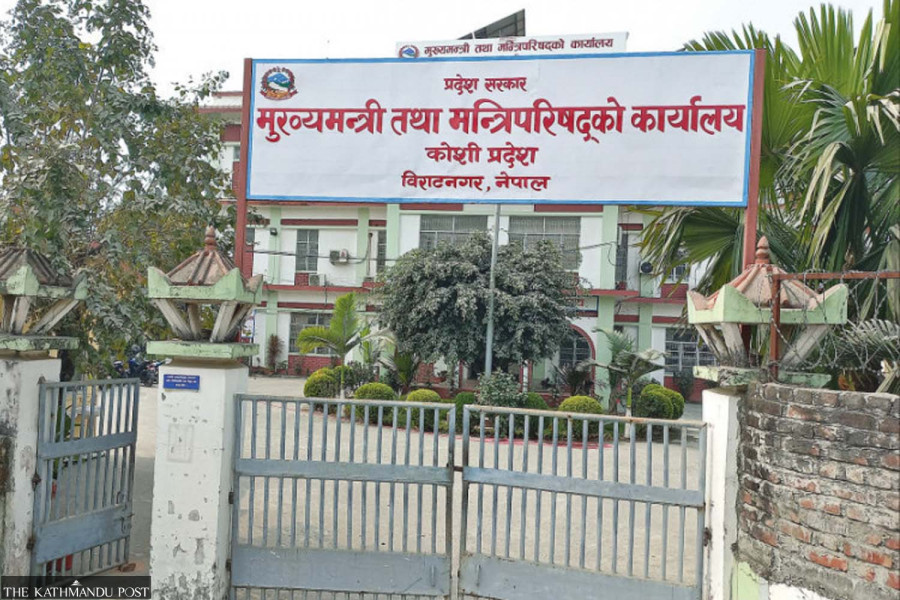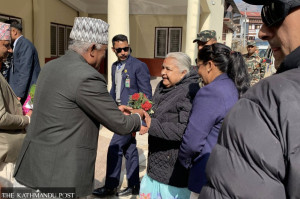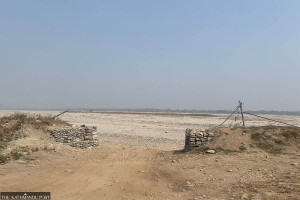Koshi Province
UML mulls Koshi exit over Karki’s Cabinet expansion plans
The chief minister reportedly also wants to appoint ministers from Maoist Centre and CPN (Unified Socialist).
Binod Ghimire
Differences are growing among the ruling parties in the Koshi province even before the government completes a month of its formation.
On October 14, Kedar Karki, a provincial assembly member from the dissident faction of the Nepali Congress, became the chief minister of the Koshi Province with the main opposition CPN-UML’s backing. He took the oath the next day, and inducted two ministers without portfolio—Ram Bahadur Rana Magar of the UML and Shamser Rai from his faction of the Congress.
Opposing the party’s decision to support Indra Bahadur Angbo of the CPN (Maoist Centre) in the chief ministerial race, eight provincial assembly members from the Congress in the country’s eastern province, had decided to form a government led by Karki, with UML’s support.
While 21 members from the party supported Angbo as per the decision of the Congress top brass, eight close to dissident Congress leader Shekhar Koirala refused to oblige. Karki became chief minister with support from 39 lawmakers from the UML in the 93-strong provincial assembly.
Now Karki wants to expand his Cabinet by inducting the ministers not just from his party and the UML, but from the Maoist Centre and the CPN (Unified Socialist) as well. “We are in consultation with all the parties that voted for us in the floor test,” Rai, the minister, told the Post.
Despite rejecting Karki's claim to the government earlier, his party’s rival faction, the Maoist Centre and the Unified Socialist voted for Karki in the vote of confidence on October 18. Only the Rastriya Prajatantra Party stood against him.
Rai said they want to turn the government into a consensus government.
The Congress, the Maoist Centre and the Unified Socialist are in an alliance at the federal level while the UML is in the opposition. But in Koshi, the UML, the largest party in the province, has joined the government. And the UML doesn’t want to see ministers from parties other than the UML and the Congress.
“We strongly oppose the idea of inducting ministers from the parties other than ours and the Congress,” Rewati Raman Bhandari, the UML chief whip at the provincial assembly, told the Post. “Our party will pull out from the government and move to opposition benches if the chief minister doesn’t heed our concerns.”
With 40 seats, the UML is the largest party in the assembly. The Congress has 29 seats, the CPN (Maoist Centre) 12, the RPP six, the CPN (Unified Socialist) four, and the Janata Samajbadi Party has one seat.
Karki was appointed chief minister as per Article 168(5) of the constitution after he laid claim to lead a new government by producing signatures of 47 lawmakers, which is a majority in the 93-member provincial assembly, before the province head. Withdrawal of the UML’s support can push the government into minority. Karki will have to go for a floor test again if the UML opts out, as per the constitution.
Article 188 (2) of the statute says in case the political party which the chief minister represents is divided or a political party in coalition provincial government withdraws its support, the chief minister shall table a resolution in the Provincial Assembly for a vote of confidence within 30 days.
As Karki’s ruling coalition was formed using the last constitutional resort to form the government, his failure to secure the provincial assembly’s confidence would mean the province is bound for snap polls. As per Article 168 (7) of the constitution, if the chief minister appointed as per Article 168 (5) fails to secure votes of confidence, the chief of the province, on recommendation of the chief minister, will dissolve the provincial assembly and fix a date for an election to be held sometime in the next six months.
“I am sure the chief minister is well aware of the consequences if the UML withdraws support. He shouldn’t forget that our party supported him even when his own party was not with him,” said Bhandari. “We hope the UML-Congress partnership here will continue for a long time.”
Karki is in Kathmandu to consult cross-party top leaders. He is expected to return to Biratnagar on Sunday and expand the Cabinet the same day. Koshi at present has eight ministries.
“Our chief minister is in consultations. He will move ahead by taking all the parties, including the UML, into confidence,” said Rai.




 20.9°C Kathmandu
20.9°C Kathmandu











